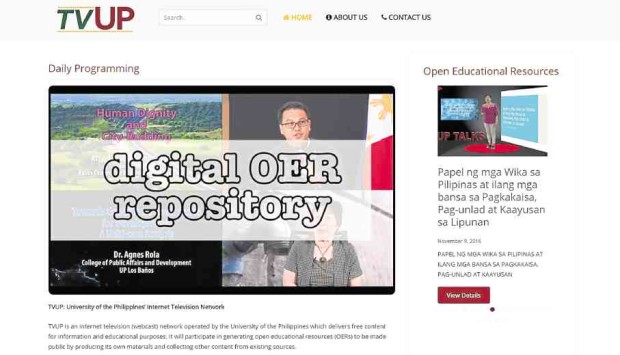Part of its mission is to regain the ground being lost to internet trolls and fake news websites.
The University of the Philippines has launched its own online broadcast network, TVUP, to deliver free educational content for the general public using a wealth of material created by UP experts, scholars and students.
“The social media has been used by a lot and also abused by many,” University President Alfredo Pascual said during the launch on UP Diliman campus on Thursday. “[With TVUP,] we can try to sort things out and provide an evidence-based and objective view of the issues confronting us.”
Calling the project a “true milestone in UP history,” Pascual, whose term ends in February 2017, stressed that the materials broadcast by TVUP are vetted for the benefit of today’s content consumers, who often have to wade through “a battlefield of trolls” that spread misinformation.
TVUP executive director Grace Javier Alfonso said the network offers a variety of programs that can point Filipinos to genuine and enriching materials in various fields: current events, business, law, the arts, and scientific innovations, among others.
“This initiative is a move for our scholars to claim space in it,” she said, adding that the channel also fulfills the mandate of the university in teaching and research.
As an open educational resource digital repository, the website—www.tvup.ph—features programs like “Financial Sense,” a financial literacy program; “Batas at Bayan,” which explores Philippine law through fiction; “Science Innovators,” which highlights the accomplishments of UP scientists, and “Kalusugan ay Karapatan,” which tackles health and wellness topics.
‘Kasaysayan at Kapangyarihan’
Philippine history drives the conversation on “Kasaysayan at Kapangyarihan,” national issues shape the agenda on “The Platform,” while the native soul and creativity animate “Philippine Art and Culture”.
TVUP will also feature documentaries and short films in “Documentaries: The Story of the Filipino” and “Maikling Pelikula.” “Musikan,” meanwhile, will showcase the talents of UP choral groups.
Daily programming will begin in early 2017. TVUP can also host the works of UP students.
Alfonso, a professor at the UP College of Mass Communication, said the university is looking at possible partnerships with television networks to carry their programs. Proposals for shows from the university’s constituent units are also welcome.
“We hope to contribute local content to our TV networks who otherwise play foreign programs,” Pascual noted.
TVUP is also open to working with other colleges and universities for the creation of more content.
Since most of the work is done voluntarily, Pascual described the project as a “low-cost operation.” Its initial funding is projected to last for three years, after which it is expected to be self-sustaining.


